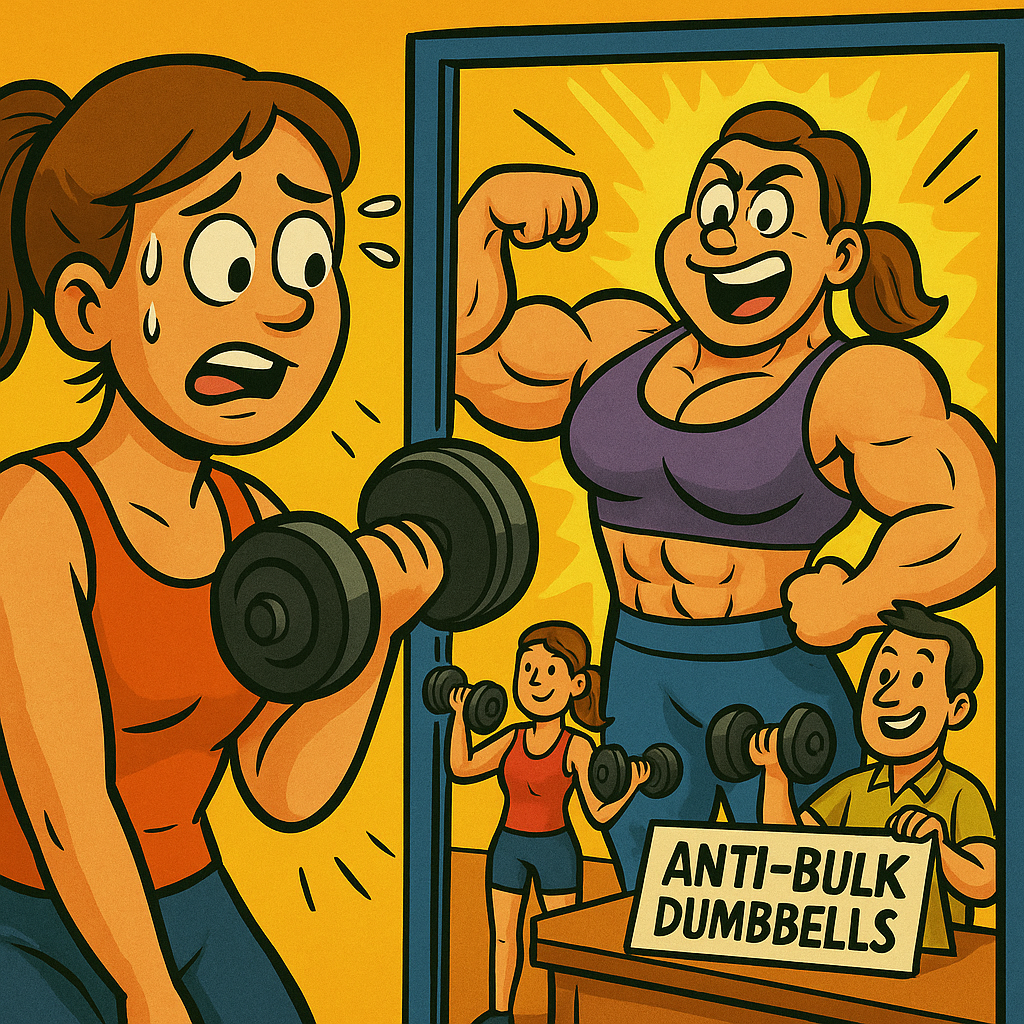Fitness Myth #2: Lifting Weights Makes You Bulky
Many fear that lifting weights will cause “bulk,” but building serious size takes years of training and high calories. Learn why strength training creates strength, tone, and health — not instant bulk.
FITNESS
Adi English
3 min read


🏋♀ Fitness Myth #2: “Lifting Weights Makes You Bulky”
📖 Article (~330 words)
This one never dies, especially in women’s fitness. The idea goes like this: pick up a dumbbell today, look like the Hulk tomorrow. People treat weights like some kind of instant muscle machine - as if a single squat turns your jeans into ripped shorts.
Reality check: lifting weights doesn’t automatically make you bulky. Building big muscle takes years of consistent training, heavy eating, and dedication. Most people struggle to gain noticeable size even when they’re trying. You won’t wake up after three sets of bicep curls looking like a pro bodybuilder.
Here’s what really happens: lifting weights makes you stronger, more toned, and improves your metabolism. For women, it often creates that lean, athletic look many are chasing. The fear of “bulky” is misplaced - if anything, most gym-goers never eat or train enough to even get close.
Bulky comes from a perfect storm: high calories, heavy progressive training, lots of recovery, and genetics. For the average person, weights mean stronger muscles, better posture, healthier bones, and a metabolism that burns more calories even while resting.
Think of it this way: lifting a dumbbell won’t make you a bodybuilder any more than picking up a paintbrush makes you Picasso. It’s the years of effort and consistency that create dramatic change.
And let’s be honest - cardio alone won’t reshape your body. Strength training adds the definition, the firmness, the shape. The myth survives because people confuse toned with bulky, but the difference is massive.
Takeaway: Weights don’t turn you into the Hulk. They help you build strength, shape, and confidence.
🗂 Vocabulary
Bulky – having very large muscles.
Simple: Looking very big and muscular.
Example: She worried lifting weights would make her bulky.
Student example: ____________
Consistent – doing something regularly over time.
Simple: Not stopping, keeping up a habit.
Example: He was consistent with workouts for months.
Student example: ____________
Metabolism – how the body uses energy from food.
Simple: The process of burning calories.
Example: Lifting weights improves metabolism.
Student example: ____________
Toned – firm and lean muscles without being very big.
Simple: Muscles that look slim and strong.
Example: Weight training can make arms toned.
Student example: ____________
Progressive training – workouts that get harder step by step.
Simple: Adding more weight or reps over time.
Example: Progressive training helps muscles grow.
Student example: ____________
Posture – the way someone holds their body.
Simple: Standing or sitting position.
Example: Weight training can improve posture.
Student example: ____________
Firmness – being strong and solid, not soft.
Simple: Muscles that feel tight.
Example: Exercise gives more firmness to the body.
Student example: ____________
Definition – visible muscle shape.
Simple: When muscles look clear and sharp.
Example: Lifting weights helps with muscle definition.
Student example: ____________
Genetics – inherited traits from family.
Simple: What you get from your parents.
Example: Genetics play a role in muscle growth.
Student example: ____________
Takeaway – the most important lesson or point.
Simple: The main thing to remember.
Example: The takeaway is that lifting won’t make you bulky.
Student example: ____________
📝 Exercises
Comprehension
What do people wrongly believe about lifting weights?
Why doesn’t lifting make people bulky?
What benefits does weight training bring?
What really causes bulky muscles?
What is the main takeaway of this article?
Multiple Choice
What does “bulky” mean?
a) Very big muscles b) Small muscles c) No muscles d) Tired muscles
What is needed to become very muscular?
a) One workout b) Genetics, training, and high calories c) Low calories d) Cardio only
What does weightlifting improve besides strength?
a) Posture and metabolism b) Laziness c) Softness d) Cardio only
What is muscle “definition”?
a) A dictionary word b) Clear visible shape c) Losing size d) Standing posture
What is the takeaway?
a) Lifting makes you bulky b) Lifting makes you lean and strong
c) Lifting is bad d) Lifting burns no calories
Fill in the Blank
Building large muscles takes years of ______ training.
Weight training often creates a lean and ______ look.
Better ______ helps you stand taller and straighter.
Muscle ______ means muscles look sharp and clear.
The main ______ is that weights don’t make you bulky.
True/False
Lifting weights instantly makes you bulky.
Consistency is important for results.
Lifting weights can improve posture.
Genetics play no role in muscle growth.
Toned muscles are firm but not huge.
Discussion
Why do you think people fear becoming “bulky”?
Do you prefer a toned or bulky look? Why?
What changes have you seen from lifting weights?
Do you think cardio or weight training is more important?
What is your personal takeaway from this article?
